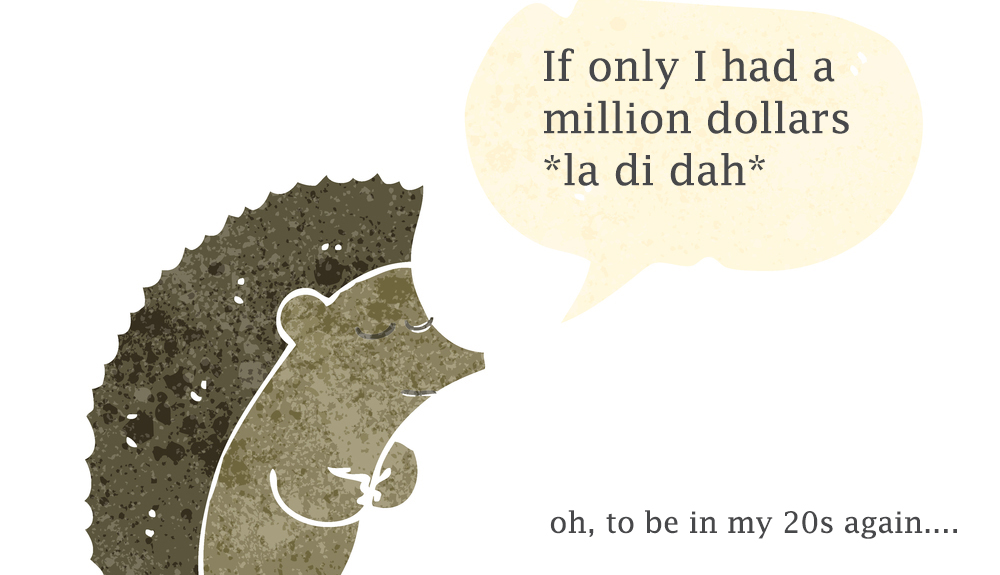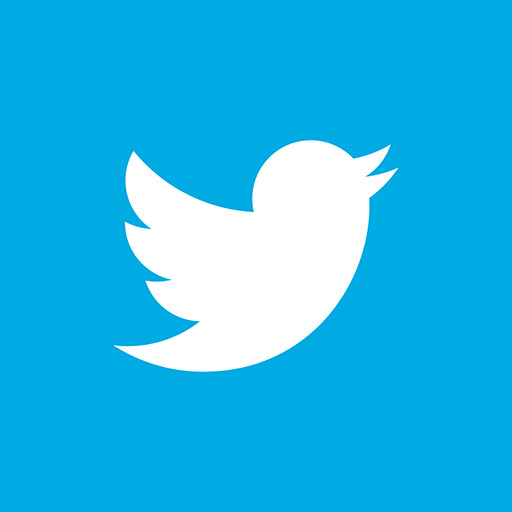Your 20s are tough. You’re trying to figure out what you want to do, who you want to be, all while trying to eke out an existence for yourself. My 20s was a period of couch-change scrounging, bargain hunting, bouts of existential crisis, and requisite floundering.
Now that I’m in my early 30s I can tell you that my life is more of the same, except that I do feel a lot happier, focused, and more confident. And it’s not that I’m super successful or have achieved amazing things. (That whole you have to achieve X and Y before you hit 30 is a myth, my friend.) It’s more about taking comfort in the fact that I am resourceful enough to get through a rough patch. I don’t have it all figured out, and probably never will, and I think that’s a good thing. It’s cool to keep learning, growing, and changing and at times laugh at your former self.
I didn’t make very much money during my 20s. Like a lot of people with creative pursuits that don’t necessarily translate to making big-time bucks, I struggle with wanting to make more money and having enough time to work on my passion projects. One thing I did do that worked out for me was that through self-education I learned a thing or two about managing my finances. Here are some things I did money-wise that helped me get through:
I moved back home.
Yea, I know. After graduating with a degree in Anthropology, my career aspirations were a little murky. All I knew was that I wanted to write in some capacity and get some real-life work experience. So I moved back home for about a year and a half, worked at a coffee shop, and interned at a couple magazines. It kind of sucked at times, but my living expenses were super low. And after I landed my first full time gig as an editorial assistant at an astrology publishing place, I waited six months until I had saved about 5k to move into my first apartment. It was a tiny single apartment on the Westside. But for $675/month in 2006 (really unheard of these days in L.A.), it was a space all my own so I couldn’t really complain.
Takeaway: Moving home can suck, but sometimes it’s a means to an end. It’s not a reason to be a professional slacker. Just make sure you have a good reason for doing so and a game plan for moving out in tact.
I paid down debt.
I was fortunate to have received a fair amount of financial aid, grants, and scholarships so my student loan debt was only at about 10k. My interest rate was pretty low (about 3% or so) and I slow-boated it. As I started making more money, I tried to pay down as much as I could more toward the principal and could pay it off sooner. I made it a priority to pay it off. If you just graduated or are about to, look into your student loan repayment options well ahead of time (I’d say at least 6 months in advance) to see what plans you qualify for.
Takeaway: Do not ignore your debt. It is not going anywhere unless you do something about it. Even if you are in a sticky situation, look into deferment or paying what you can until you are in a better place to pay it off. Make it a priority. You really don’t want the debt hanging over your head to get in the way of your goals.
I invested in myself.
I took evening classes at a nearby community college and through online university extension programs in graphic design, fiction writing, and completed a certification in copy editing. While this wasn’t as fancy as going to grad school or getting an MBA, the certification in copy editing has paid for itself many times over. I was able to get freelance work on novels and magazines. Not only was it a lot of fun, but it felt nice to generate some extra cash. My work paid for some of the less expensive courses and half of the ones at UCLA Extension because learning these skills would help me contribute more to the job.
Takeaway: Invest in yourself by taking classes that will help you in your career and also with your creative pursuits. Ask your employer if they offer compensation for continuing education. Even partial compensation would be rad. There’s also a wealth of online courses these days, i.e., lynda.com. I’ve been using Lynda as long as I finished college, and have used it to learn about everything from InDesign, Photoshop, Excel. The best part about Lynda is that you can just watch a short video that gives you instruction on exactly what you’re trying to learn, and apply that skill right away. I know that Lynda offers a 10-day free trial, and you can literally spend days learning a ton from their video tutorials.
I learned how to budget.
I am a little bit of a “budgeting fanatic or a “budgeting whore” rather. I usually am trying out several apps at once. Whenever there’s a new method or app for personal budget, I am one of the first to jump on the bandwagon and check it out. I started getting into budgeting during college and used a simple system I created in an Excel sheet. Was it tedious? Sure. But it helped me figure out where my expenses were and what areas I went a little overboard in. And eventually I developed my own budgeting style. These days there are plenty of budgeting apps (i.e., Digit, Mint, Learnvest, Level Money) that makes it much simpler. I can wag my finger like a little old lady at you youngins and say how much harder I had it than you.
Takeaway: The sooner you learn how to budget, the better. It’s not about getting it perfect, it’s about starting out and being okay at it.
I side hustled.
I test proctored, did some catsitting, and some freelance editing on the side. Any extra money I earned was “get away” money, money I saved for something big like a vacation or new computer.
Takeaway: Finding ways to make extra revenue is a great way to pay down debt, keep yourself financially afloat, or “get ahead” on your other goals. I’m a little envious of the youth of today, because there are so many ways to side hustle.
I played the frugality game.
I became a master at saving money whenever I could. When I was 24 and signed my first lease, I felt like a total grownup. But I was also terrified. Terrified that something would happen to my job, I wouldn’t make ends meet, and have to break my lease. So I learned to be really good at being frugal. Remember there’s a huge difference between being stingy and being frugal. Being stingy is trying to get everything at the lowest price and living a somewhat miserable existence. Frugality, on the other hand, is about being resourceful and figuring what the value of certain things are to you. I cut back on everything from on groceries, eating out, clothes shopping, going out. If you turn it into a game and have your sights on the big picture, it’s kind of enjoyable.
Takeaway: Try to save where you can. The three biggest expenses you have are shelter, food, and transportation. Cutting back in any of these three areas is a great place to start.
I did not upgrade my lifestyle.
Whenever I got a promotion, raise, or jumped jobs that upped my income, I didn’t make drastic changes to my lifestyle. I drove the same car, I lived in the same place, and kept the same lame-o friends (just kidding, I love my buddies!) I lived like a pseudo-urban monk and due to living in a super small space, kept my possessions to a minimum. There were moments when I thought I would turn out like the 80-year-old Korean woman who lived in an identical studio apartment across the way for 40 years, but I knew I had to focus on some of my other goals like start saving for retirement and pay down my debt before I could move into a larger space.
Takeaway: By maintaining your same lifestyle despite having more money, you’ll be able to put that money toward other things while having the freedom that if something happened, you won’t get into a pickle. We can talk about how to know it’s the right time to upgrade to a bigger place, buy a nicer car at a later day.
Being in your 20s is exciting yet also can be nerve-wracking. It’s tough to make it work, whether you’re trying to start your own business, carve out a career path, or balance your artistic passions with making a living. But with a little bit of balance, self-knowledge, and discipline, you’ll make it through.
How are you making it through your 20s?





